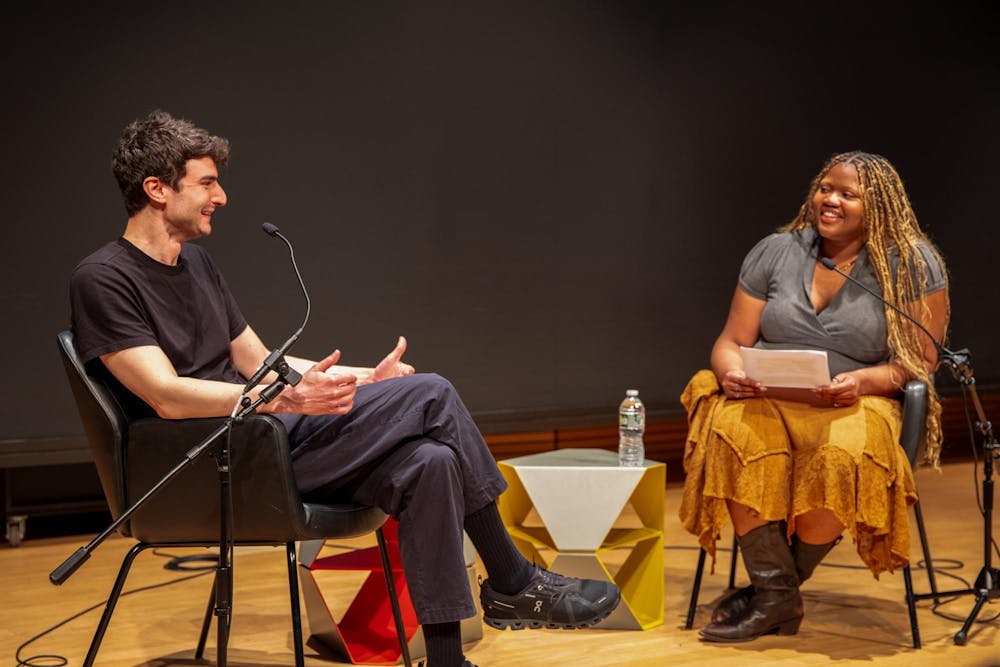From the unbridled passion of tennis to nonverbal displays of eroticism, Justin Kuritzkes ’12 examined the art of screenwriting during a Saturday afternoon conversation with moderator Kendall Ricks ’27, a current Herald columnist. The talk, hosted in the Granoff Center for the Creative Arts, was the penultimate guest speaker event for the 24th-annual Ivy Film Festival.
After spending the first decade of his career as a playwright, Kuritzkes rose to national prominence for his critically acclaimed screenplays “Challengers” and “Queer,” both directed by Luca Guadagnino. In 2019, Kuritzkes also published his debut novel “Famous People,” a fictional memoir of a young pop star grappling with the divide between himself, and the so-called normal people around him.
Even before starting college, Kuritzkes knew he wanted to become a writer. By the age of 15, he had already produced his first professional play. Upon attending a show put on by the Production Workshop — Brown’s oldest student-run theater group — Kuritzkes knew he wanted to pursue his creative journey at Brown, he said.
“I just remember being so amazed at the idea that people my age ran (T.F. Green Hall),” said Kuritzkes. “That was totally intoxicating.”
Studying philosophy and literary arts during his time at Brown, Kuritzkes reflected on how analyzing philosophical truths through a “brutally formalistic manner” later translated into his “tolerance for rigor” as a screenplay writer.
“It’s all about real estate,” he said. “You’re always in a race against time and a race against the audience’s opinions.”
According to Kuritzkes, a screenplay is both an exciting, meaningful reading experience and a codified literary document that serves as an architectural blueprint for the filmmaking process.
“The most important thing, especially when starting out, is to write a movie you actually want to see and be very honest with yourself about what kind of movie you like,” said Kuritzkes.
For Kuritzkes, Serena Williams’s 2018 U.S. Open match sparked a three-year obsession with tennis. This obsession, paired with the opening scene of David Lean’s “Brief Encounter,” served as critical inspiration for “Challengers,” Kuritzkes’s 2024 film centered around an intense love triangle between three tennis players.
“I was really enjoying being a fan,” he said. “I was watching matches (between) Roger Federer and Rafael Nadal in 2008, and it was like seeing this amazing movie.”
Kuritzkes’s interest in tennis was driven by the tension between the formalized nature of tournaments like Wimbledon — which features a strict dress code and the attendance of royals — and the animalistic, primal drive of competitors, he said.
“Tennis felt like there was all of this pent up repression. I kind of realized within myself that that’s what drew me to it,” Kuritzkes said. “In a way, ‘Challengers’ was a way of working out that obsession.”
Judd Karn ’27, who analyzed the script of “Challengers” for LITR 1010E: “Advanced Screenwriting,” appreciated the film’s innovative development of character dynamics and looked to Kuritzkes’s work for inspiration when writing his own screenplay.
“In the end, it’s more about the connection between people,” Karn said. “I thought that ‘Challengers’ executed that driving point of using tennis as a motive for this relationship really well.”
In “Queer,” a movie in which two middle-aged queer men fall in love and communicate telepathically after consuming a hallucinogenic drug, Kuritzkes similarly built cinematic tension and intimacy nonverbally. Through their relationship, Kuritzkes explored the “real terror” in building intimacy through nonverbal communication.
Love triangles are another lens through which Kuritzkes enjoys building dramatic potential.
“Why I was drawn to love triangles — at least in ‘Challengers’ — is that the triangle is this very tense and potent and violent shape,” he said. “If you move one point in the triangle, all the other angles have to adjust themselves.”
When watching a film with a love triangle and viewing a romantic relationship between two characters from a third perspective, a supercharged sense of empathy is evoked in the audience, Kuritzkes explained.
Although Kuritzkes has 20 years of experience in professional writing, he noted that many in Hollywood still view him as just starting out in his career. Concluding his talk, he reflected on the financial pressures and emotional setbacks that many in the industry face, sharing his own story of working part-time jobs to sustain his career goals as an artist.
“It can be especially tough when you come from a place like (Brown), and you’re 25 and you’re seeing friends get jobs, good salaries, buying houses,” he said. But he reminded young, aspiring writers that in the face of setbacks, the popular reception of their work “cannot and should not have any merit on your understanding of your work or your understanding of yourself as an artist.”
Alex Isbell, a junior studying dramatic writing at the New York University Tisch School of the Arts and an attendee at the event, shared how Kuritzkes’s perspective offered a refreshing and meaningful insight into his artistic journey.
“To hear a talk from someone who really cares about the craft and made it by writing,” Isbell said, “is so inspiring.”





